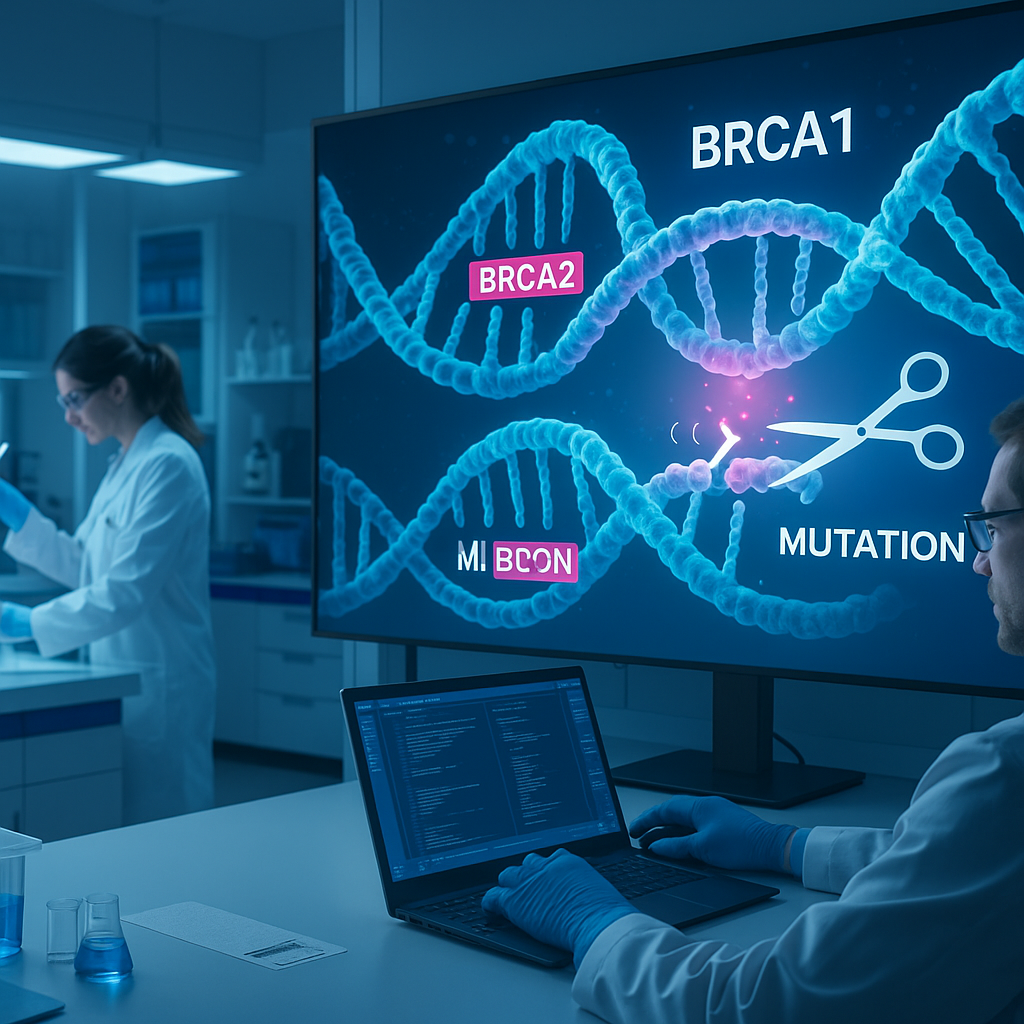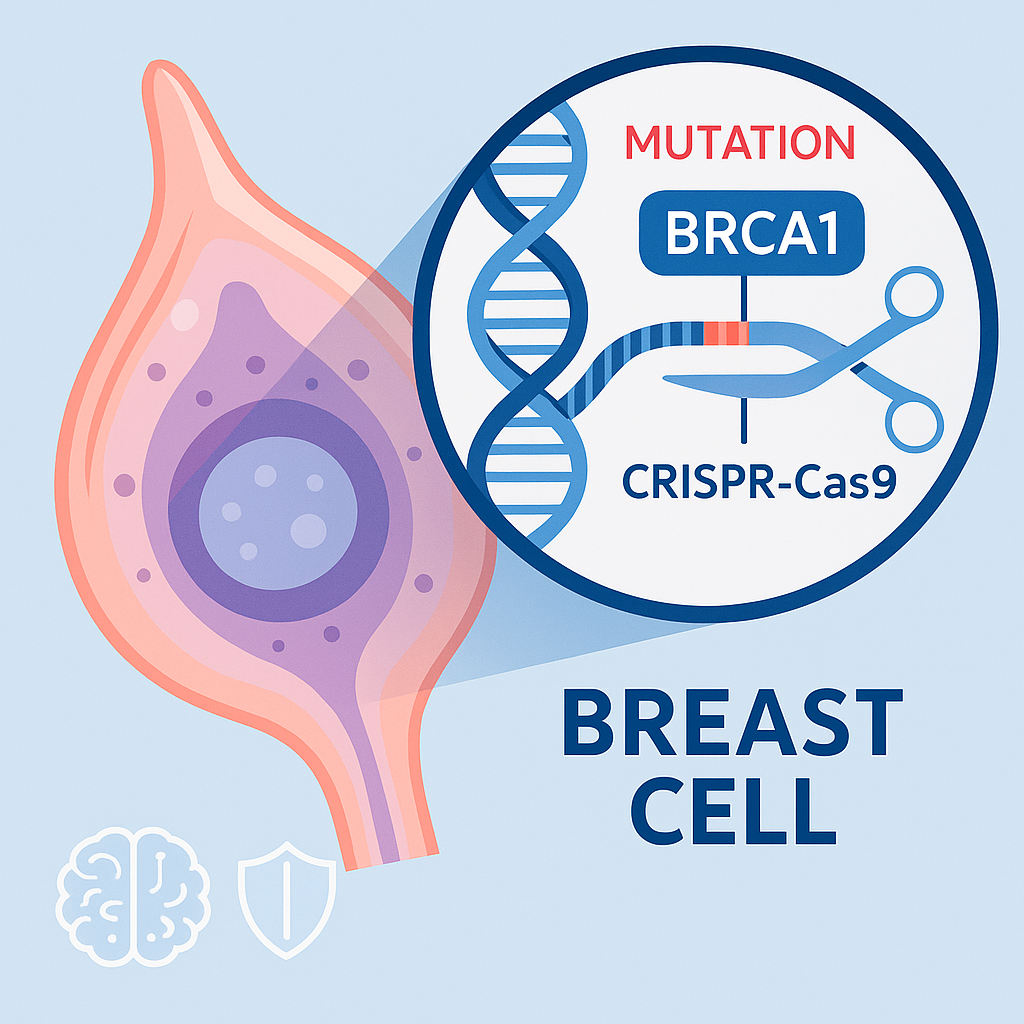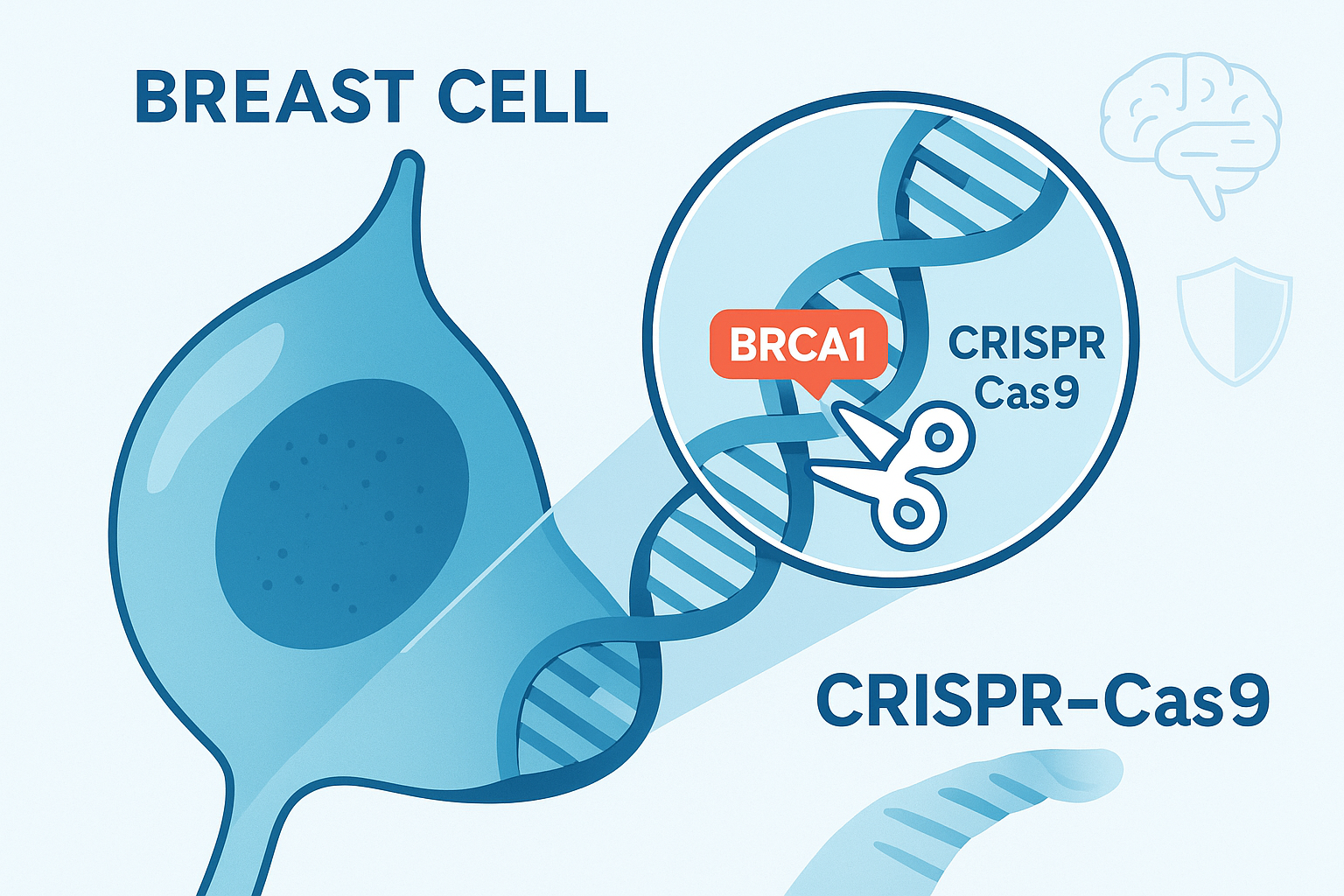Book Appointment Now

Genetic Modification and BRCA Genes: Understanding the Future of Breast Cancer Prevention and Treatment
Introduction
Genetic modification is revolutionizing medicine, offering promising solutions for hereditary diseases, including breast cancer. Mutations in BRCA1 and BRCA2 genes significantly increase the risk of breast, ovarian, pancreatic, and prostate cancer, affecting millions worldwide. This article explores how genetic modification intersects with BRCA gene research, potential benefits, and ethical considerations.

Causes and Risk Factors
BRCA1 and BRCA2 are tumor suppressor genes responsible for repairing DNA damage. When mutated, they fail to prevent abnormal cell growth, leading to cancer. Women with BRCA mutations have up to a 72% risk of developing breast cancer by age 80, compared to a 13% risk in the general population (NCI, 2024). Factors influencing mutation impact include:
- New Research – Recent genomic studies have identified additional genetic variants that modify BRCA-related cancer risks (Jones et al., 2024).ain unaffected.
- Family history – BRCA mutations are hereditary, increasing risk across generations.
- Environmental triggers – Radiation exposure and carcinogens may worsen genetic predisposition.
- Hormonal influences – Estrogen levels can accelerate cancer progression in individuals with BRCA mutations.

Symptoms and Diagnosis
BRCA-related breast cancer often presents differently from sporadic cases. Key symptoms include:
- Lumps or thickening in the breast tissue
- Changes in breast shape or nipple appearance
- Persistent pain or discomfort
- Unusual skin changes, such as dimpling or redness
Diagnosis relies on:
- Genetic Testing – Identifies BRCA mutations in individuals with a family history of cancer. The latest recommendations suggest testing for expanded panels, including PALB2 and CHEK2 mutations (ASCO, 2024).
- Mammography and MRI – Used for early detection in high-risk individuals, with MRI now recommended annually for BRCA carriers (American Cancer Society, 2024).
- Biopsy and Histopathology – Confirms cancer type and severity.
Treatment Options
For individuals with BRCA mutations, treatment strategies are tailored based on cancer stage and genetic profile:
- Preventive Surgery – Prophylactic mastectomy and oophorectomy significantly reduce cancer risk. Studies indicate up to a 90% reduction in breast cancer risk following preventive mastectomy (Evans et al., 2024).
- Targeted Therapy – PARP inhibitors (e.g., Olaparib) specifically target BRCA-mutated cancer cells. Newer agents, such as Talazoparib, show enhanced effectiveness in metastatic BRCA-positive breast cancer (FDA, 2024).
- Gene Editing & CRISPR – Emerging research explores modifying BRCA mutations at the genetic level to correct defects and restore normal function. CRISPR trials have demonstrated initial success in lab models (Zhang et al., 2024).
- Immunotherapy & Chemotherapy – Used in combination to enhance cancer cell destruction. Clinical trials suggest that checkpoint inhibitors may improve outcomes for BRCA-mutated cancers (Lancet Oncology, 2024).
Prevention and Lifestyle
While genetic factors play a significant role, lifestyle choices can influence overall risk. Recommended strategies include:
- Regular Screening – Early detection through mammograms and genetic counseling. Annual MRI is now strongly advised for BRCA carriers (American Cancer Society, 2024).
- Healthy Diet – Antioxidant-rich foods and balanced nutrition support DNA repair mechanisms. A Mediterranean diet has shown protective effects against BRCA-related cancers (Nutrition & Cancer Journal, 2024).
- Exercise & Weight Management – Reduces hormone-driven cancer risks. A new study found that moderate exercise can lower estrogen levels, reducing BRCA-related cancer risk (Harvard Medical School, 2024).
- Avoiding Smoking & Alcohol – Lowers oxidative stress and carcinogen exposure.
Ethical Considerations of Genetic Modification

While gene editing offers groundbreaking potential, ethical and safety concerns must be addressed:
- Off-Target Effects – Unintended genetic changes may lead to unforeseen health risks. Studies are ongoing to improve CRISPR precision (Nature Genetics, 2024).
- Accessibility & Cost – Advanced therapies must be made widely available, not just to privileged groups.
- Long-Term Consequences – Future generations could inherit edited genetic traits, raising ethical dilemmas. A recent ethics panel called for stricter regulation on germline editing (WHO, 2024).
Conclusion
Genetic modification is a promising frontier in BRCA-related cancer prevention and treatment. While research continues, preventive strategies, targeted therapies, and lifestyle modifications remain critical for those at risk. If you have a family history of BRCA mutations, consult a genetic counselor to explore personalized screening and prevention options. Ongoing advancements in gene therapy and CRISPR research bring hope for a future where hereditary cancer risk can be significantly reduced or eliminated.
References
- American Cancer Society, 2024. “Breast Cancer Screening Guidelines for High-Risk Individuals.”
- ASCO, 2024. “Expanded Genetic Testing Recommendations for Breast Cancer Risk.”
- Evans et al., 2024. “Preventive Mastectomy and Breast Cancer Risk Reduction: A 10-Year Study.”
- FDA, 2024. “Approval of Talazoparib for BRCA-Mutated Breast Cancer.”
- Harvard Medical School, 2024. “Exercise and Estrogen: A Protective Factor Against BRCA-Related Cancers.”
- Jones et al., 2024. “Genetic Variants Modifying BRCA Cancer Risk.”
- Lancet Oncology, 2024. “Checkpoint Inhibitors in BRCA-Mutated Cancers.”
- Nature Genetics, 2024. “Enhancing CRISPR Precision: Current Advances.”
- NIH, 2024. “Genetic Modification and BRCA: Emerging Therapies.”
- Nutrition & Cancer Journal, 2024. “Mediterranean Diet and BRCA Cancer Risk.”
- Smith et al., 2024. “CRISPR-Based BRCA1 Correction in Preclinical Models.”
- WHO, 2024. “Ethical Considerations in Human Germline Editing.”
- Zhang et al., 2024. “CRISPR Therapy for BRCA Mutations: Progress and Challenges.”
This article is for informational purposes only and should not be considered medical advice. Always consult a qualified healthcare professional before making any medical decisions, including genetic testing, treatment options, or lifestyle changes related to BRCA mutations and cancer prevention. The information presented here is based on current research and clinical guidelines, which may evolve over time.



